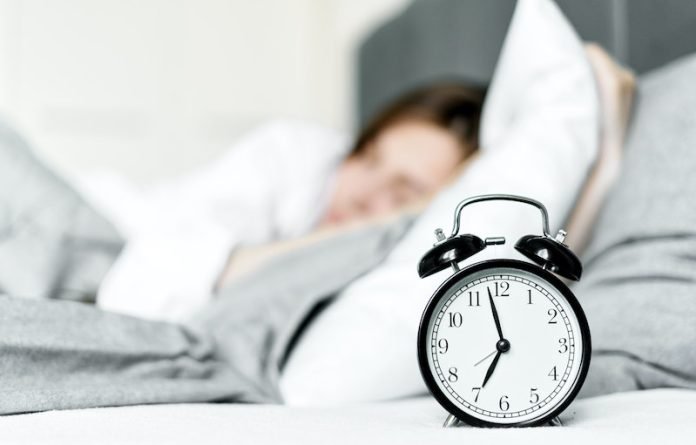
New research suggests that people with irregular sleep patterns may face a substantially higher risk of developing high blood pressure than those who maintain a consistent sleep schedule, even when they get the recommended amount of sleep each night.
The study by Flinders University found that people who slept in on weekends or varied the times they went to bed and woke up throughout the week were much more likely to have high blood pressure than those with more regular sleep routines.
The researchers note that while previous research has linked sleep duration to high blood pressure, little attention has been paid to the impact of the nightly variation in sleep schedules.
The team followed the sleep patterns of 12,287 adults with and without high blood pressure from 20 different countries over a nine-month period.
The researchers used a device placed under the mattress to measure sleep timing and duration.
They found that people whose bedtimes varied by 90 minutes or more faced a 92% increased risk of high blood pressure compared to those who stuck to a regular bedtime.
Even those whose bedtimes varied by slightly more than 30 minutes from night to night were 32% more likely to have high blood pressure.
The study also found that people who slept for less than seven or more than nine hours were 20%-30% more likely to have high blood pressure.
Additionally, people whose sleep duration varied by two hours or more from night to night were 85% more likely to have hypertension than those with less than an hour’s difference in the amount of sleep they got each night.
Sleeping late was also associated with a higher risk of high blood pressure, although less so than not getting to bed on time. Waking up 43 minutes later was associated with a 9% increase.
These findings suggest that people may need to consider not only how long they sleep, but also the importance of keeping a regular sleep schedule for optimal cardiovascular health
While work schedules and other commitments can sometimes make it hard to maintain a regular sleep schedule, the study confirms the need for people to try to be as mindful as possible about sleep.
The American Heart Association recommends adults get seven to nine hours of nightly sleep to promote optimal heart and brain health.
The recommendation is based on prior research that found people who get less than six hours of sleep per night on average face a much higher risk for high blood pressure, obesity, cardiovascular disease, and premature death.
Likewise, those who get too much sleep – more than an average of nine hours per night – face higher risks for high blood pressure, stroke, Type 2 diabetes, and death.
If you’re struggling with an irregular sleep pattern, there are a few things you can try to help regulate your sleep schedule:
Stick to a consistent sleep schedule: Try to go to bed and wake up at the same time every day, even on weekends. This helps regulate your body’s internal clock and can improve the quality of your sleep.
Limit exposure to screens before bed: The blue light emitted by electronic devices like smartphones, tablets, and laptops can interfere with your body’s production of melatonin, a hormone that helps regulate sleep.
Create a relaxing bedtime routine: Engage in activities that help you wind down before bed, such as taking a warm bath, reading a book, or practicing relaxation techniques like deep breathing or meditation.
Avoid caffeine and alcohol close to bedtime: Caffeine is a stimulant that can keep you awake, while alcohol can disrupt the quality of your sleep. Try to avoid consuming these substances in the hours leading up to bedtime.
If you care about blood pressure, please read studies about a key contributor to high blood pressure, and your age may determine which blood pressure number matters most.
For more information about blood pressure, please see recent studies that early time-restricted eating could help improve blood pressure, and results showing plant-based foods could benefit people with high blood pressure.
The study was conducted by Danny Eckert et al and published in the journal Hypertension.
Copyright © 2023 Knowridge Science Report. All rights reserved.



